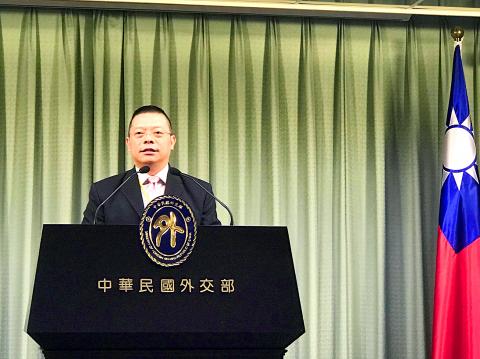The Japanese government welcomes all countries, including Taiwan, that can accept the principles and standards of a Japanese-led international economic bloc and has called on Taipei to solicit support to join the Comprehensive and Progressive Agreement for Trans-Pacific Partnership (CPTPP), a Taiwanese diplomat said yesterday.
The government has confirmed Tokyo’s official stance of welcoming Taipei’s bid to join the CPTPP, Taiwan-Japan Relations Association Deputy Secretary-General Hsieh Bor-huei (謝柏輝) told a news briefing.
It has always been Japan’s stance that such a trade deal would be open to countries or regions that accept its principles and are willing to meet its standards, Hsieh added.

Photo: Peng Wan-hsin, Taipei Times
Japan also suggested that Taiwan should solicit support from more CPTPP members, because the trade group operates by consensus, he said.
A previous comment made by Japanese Minister of Foreign Affairs Taro Kono, who said that Taiwan’s decision to maintain a ban on Japanese food products from areas affected by the Fukushima Dai-ichi nuclear power plant disaster might hamper Taipei’s bid to join the CPTPP, was made in response to media inquires and might only reflect his personal view, Hsieh said.
On Nov. 24 last year, 78 percent of Taiwanese voters cast ballots in favor of the ban.
Asked about Tokyo’s stance regarding the result during a Dec. 7 news conference, Kono expressed disappointment and said that his government would consider filing a complaint with the WTO.
Hsieh said that Taiwan has been trying to amend ties with Japan since the referendum.
Taiwan is considering learning from the US and the EU, which screen certain food products imported from Japan’s nuclear disaster-affected areas to ensure they are safe to eat, instead of banning them altogether, he said.
“In this way, we can make sure the health of Taiwanese is protected, while at the same time staying in line with international standards when dealing with food safety issues,” he said.
The CPTPP last month agreed to expand its membership during its first commission meeting in Tokyo.
Participating countries in a joint ministerial statement highlighted the importance of expanding the agreement by taking in new members to form a stronger united front against the rise of protectionism.
CPTPP member countries understand that Taiwan is interested in joining the trade bloc, and the government would continue to communicate with them and seek their support, the Ministry of Foreign Affairs said in a statement.
The CPTPP came into being after US President Donald Trump pulled out of the Trans-Pacific Partnership in January 2017.
The other 11 Trans-Pacific Partnership countries — Canada, Australia, Brunei, Chile, Japan, Malaysia, Mexico, New Zealand, Peru, Singapore and Vietnam — renegotiated the free-trade deal and signed it in March last year.

Nipah virus infection is to be officially listed as a category 5 notifiable infectious disease in Taiwan in March, while clinical treatment guidelines are being formulated, the Centers for Disease Control (CDC) said yesterday. With Nipah infections being reported in other countries and considering its relatively high fatality rate, the centers on Jan. 16 announced that it would be listed as a notifiable infectious disease to bolster the nation’s systematic early warning system and increase public awareness, the CDC said. Bangladesh reported four fatal cases last year in separate districts, with three linked to raw date palm sap consumption, CDC Epidemic Intelligence

Two Taiwanese prosecutors were questioned by Chinese security personnel at their hotel during a trip to China’s Henan Province this month, the Mainland Affairs Council (MAC) said yesterday. The officers had personal information on the prosecutors, including “when they were assigned to their posts, their work locations and job titles,” MAC Deputy Minister and spokesman Liang Wen-chieh (梁文傑) said. On top of asking about their agencies and positions, the officers also questioned the prosecutors about the Cross-Strait Joint Crime-Fighting and Judicial Mutual Assistance Agreement, a pact that serves as the framework for Taiwan-China cooperation on combating crime and providing judicial assistance, Liang

The manufacture of the remaining 28 M1A2T Abrams tanks Taiwan purchased from the US has recently been completed, and they are expected to be delivered within the next one to two months, a source said yesterday. The Ministry of National Defense is arranging cargo ships to transport the tanks to Taiwan as soon as possible, said the source, who is familiar with the matter. The estimated arrival time ranges from late this month to early next month, the source said. The 28 Abrams tanks make up the third and final batch of a total of 108 tanks, valued at about NT$40.5 billion

Reports of Taiwanese going missing, being detained or interrogated, or having their personal liberties restricted in China increased about fourfold annually last year, the Mainland Affairs Council (MAC) said yesterday. Last year, 221 Taiwanese who traveled to China were reported missing, were detained and interrogated, or otherwise had their personal freedom restricted, up from 55 the previous year, the council said. Reopening group tours to China would be risky, as it would leave travelers with no way to seek help through official channels after Beijing shut down dialogue between the associations tasked with handling cross-strait tourism, the MAC said. Taipei’s Taiwan Strait Tourism